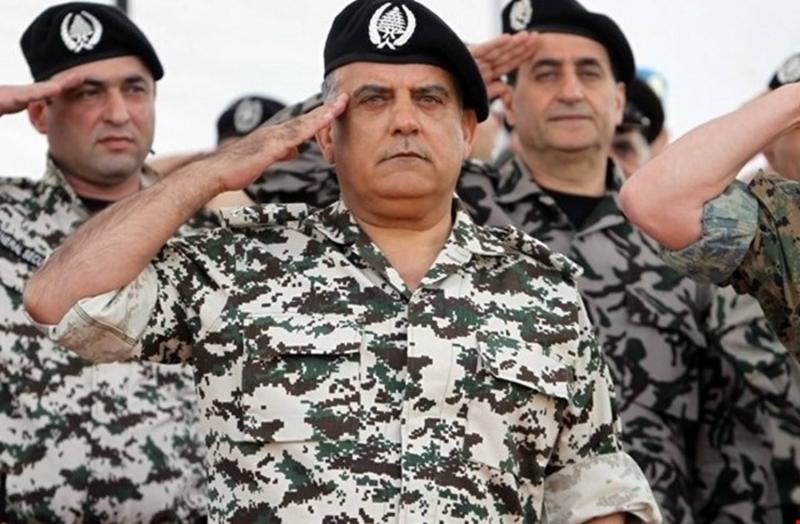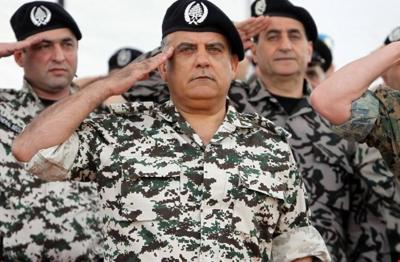Major General Abbas Ibrahim has stepped down from his position as the Director General of General Security in Lebanon, but the role he played since his appointment in 2011 has not left him. The morning after his term ended, the "former" Director General received a delegation from the Bazi family, whose son, Mohammed, was detained in Romania at the request of U.S. authorities. Ibrahim made contacts with the Lebanese ambassador in Romania, as well as with Foreign Minister Abdallah Bou Habib, and he was ready to reach out to the Directors of General Security and Intelligence in Romania if necessary, ultimately providing practical advice and guidance on how to deal with this case.
After leaving his post, which he entered in 2011, Major General Ibrahim is taking a short break "to gather documents and prepare his future plans." He has received many job offers from abroad, some enticing, but none of them appeal to him. He wishes to pursue a political career in Lebanon and will not leave "unless he loses hope."
This role continues due to Ibrahim's connections and experience, but his departure from the position was dramatic. While everyone expected an extension of Ibrahim's term, which ended last week, they were surprised when the door to solutions was closed in a country where politicians are accustomed to tailoring laws to their preferences. Ibrahim declines to point fingers at who is responsible for the failed attempts to extend his tenure but subtly references Prime Minister Najib Mikati, "who sounded the real starting whistle," when he stated that he would "abide by the law concerning this matter."
Ibrahim emphasizes that he did not wish to extend his mandate, except due to the inability to appoint a successor, suggesting he would stay in the position until a new president is elected and a fully qualified government can appoint a new Director General of General Security. He states that he informed "those concerned" five months ago that he did not wish to remain in his position at the end of his term, yet he yielded to the idea of a "temporary" extension.
Mikati claimed there was a purely legal aspect to this issue, saying, "I do not accept political appeals." "He spoke in a way that caused confusion among the citizens and the political authority. Notably, a group of legal experts found legal solutions for the extension, yet these were disregarded." Ibrahim remarked, "Mikati initially wanted a legal solution without politics, and later politics without law, which is what led us here. In simple terms, Brigadier Elias Baisari has assumed this position in an acting capacity, and he is among the best officers. I told him that my experience and capabilities are at his disposal."
Ibrahim notes that everyone did what was expected of them; for instance, Speaker Nabih Berri called for a session, but it did not materialize. Meanwhile, Minister Gebran Bassil said he was ready to secure a quorum in Parliament for urgent legislation, and "urgency" is a vague term. Bassil stipulated that the extension law should apply to all directors general, which was not heeded, so nothing occurred.
However, Ibrahim sees a positive aspect in the manner of his departure, "which reflected the feelings of the people towards the former Director General of General Security, and how citizens viewed this directorate. This is something I take great pride in and it honors me, compensating for the drama of the departure."
Ibrahim played the role of "mediator of the republic," moving between officials in an attempt to bridge gaps on various contentious issues. The formation of governments has consumed much of Ibrahim's efforts, as well as many other contentious files, in which he succeeded in some areas and failed in others due to "political pettiness." However, Ibrahim confirms that he did not exceed his role as Director General of General Security, which has very broad powers under its establishment law, as political, social, and economic security is central to his work.
He states, "The first thing I did upon taking this position was read the directorate's statutes and the powers of the Director General. Today, after 12 years, I have not been able to fulfill, despite everything I have done, the law's mandate, because the powers are very extensive." He insists that "nothing that has occurred or that I have done in the directorate as a mediator of the republic was outside the powers of the general directorate or the director of General Security. There are directors who have not exercised all these powers. However, during my tenure, it was largely a period of void at all levels, and nature detests voids, and I filled this void with my work. I can say that in most positions I was able to act as a mediator of the republic and manage to round corners and reach the desired results."
Regarding his evaluation of the work of politicians in Lebanon, he observes that "pettiness dominates political performance, and action and reaction predominates over political opinion. In general, there is no planning in Lebanon; we live in a world of reactions. This mentality will have negative repercussions if it continues. We must escape from it because this performance is destructive. The results are before us, what we have reached should be a motivation for them to change, but nothing has changed."
Ibrahim's desire to engage in politics is no secret; he has expressed it publicly several times. After leaving the job for the vast world of politics, he asserts that he will not join any group on the scene, stating, "In all my performances, I was independent and established a basis for the way I think. I believe I will remain largely independent without straying from the Lebanese reality, namely, the sectarian and confessional reality that imposes itself, but I will maintain a very large margin titled my independence and work independently of everyone."
Regarding people's "aversion" to those in security positions, Ibrahim says: "I come from a school that believes security serves humanity, not the other way around. What may have been practiced previously over the years was the exception, and the way I worked was the correct one. This brought citizens closer to us. Our office became a refuge for anyone seeking service or mediation anywhere in the world, and this built trust between us and the citizens. We have not been known to hold anyone accountable for their political views or criticism of the directorate."
During his last years in office, General Security faced significant difficulties and a decline in services, most notably as seen in the long lines of people waiting outside its offices to obtain passports. Internally, it has been greatly affected by the decline in purchasing power among the Lebanese, including officers and personnel of the agency. Ibrahim quotes the Greek philosopher Plato: "Eat, then philosophize." He says, "Our personnel were working while starving, and I am convinced of this. We were able to take many measures to meet some of the needs of the personnel and their families and ensure their continued life, but unfortunately, we could not restore them to the level they lived at before the crisis, because this is the responsibility of the state as a whole."
Regarding the passport crisis, Ibrahim stresses, "It is not the responsibility of General Security, but of the state. There is a passing of responsibility between the government and the governor of the central bank. From our side, we completed the required tender and needed $15 million. We have no funds, and when we collect passport fees, we hand them directly to the Ministry of Finance."
Major General Ibrahim leaves his security position confident in the quality of security, but he refuses to be complacent, saying, "When a security person is complacent, disasters occur." He asserts that "with the will of the security agencies, the army, and the awareness of citizens, the security situation is good, but the big fear is social security. This is a fear and an important factor because the Lebanese people are gathering for the first time in this way over a common issue: poverty and hunger. This unifies them. However, the security situation is good. But the social situation might escalate into confrontations in the streets between citizens and security agencies, but it does not constitute fear in the security sense."
On the other hand, he points out that "there are sleeper cells of terrorist organizations in Lebanon, most of which are under surveillance and monitoring. Coordination among the security agencies is ongoing on this matter."
Ibrahim emphasizes the coordination between security agencies on every occasion, but when asked if it is normal to have such a number of security agencies in Lebanon, he replies, "No, it is not normal." He attributes this to "the congestion and multitude of sects, which is the reason. Countries around the world reorganize their agencies periodically and unify them, each within its jurisdiction," and adds, "We have sects that impose a multitude of agencies. Unfortunately, the Shiites have one agency, the Sunnis have one, and the Christians have two agencies for balance. This pushes us to think seriously about abolishing sectarianism and moving towards a civil state to become citizens, not sects. It's time to become citizens in this country and to be more religious and less sectarian. Let us distance ourselves from sectarianism and draw closer to God."
A significant part of Ibrahim's role has been external. He states, "I assumed the directorate at the beginning of the Syrian crisis, which had a significant impact not only on Lebanon but on the world. When diplomatic relations were severed with most countries with Syria, these countries needed a foothold, at least to look into Syria, and vice versa. Thus, it was agreed upon Ibrahim to be the figure who could communicate with both Syria and the West at the same time. Over nearly 12 years, we accomplished various tasks, some of which were announced and most of which were not disclosed. We were able to mitigate many negatives resulting from this communication, starting with Lebanon and Syria and ending with brotherly and friendly countries around the world. Thus, these channels were effective, and at times we transitioned from security pathways to diplomatic and political ones. There are many matters I have not disclosed due to their sensitivity, but I believe I have fulfilled my role to the fullest."




